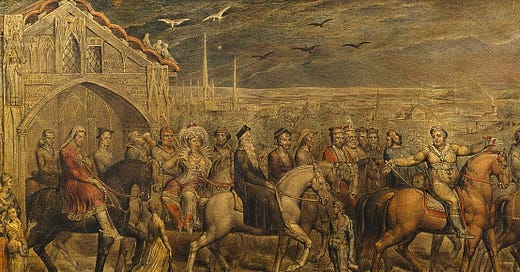When the merry and yet serious poet Geoffrey was refreshing himself at the Tabard Inn, in Southwark, he fell in with a company of pilgrims making their springtime way to Canterbury, to the shrine of Saint Thomas Becket, whose prayers had assisted them when they were sick. We can say a lot about that crazy company — about Alison, that woman who lived near Bath, who had five husbands, and who went to bring the offerings at Mass with five pounds of fancy hat on her head; about the good Knight who had fought in the Holy Land and Prussia and Turkey and everywhere, whose clothing was still soiled with the signs of his labor; about the Pardoner who claims to have gotten his rolled-up scrolls of pardon “all hot from Rome,” but who likely saw as much of Rome as he had seen of Timbuktu — and about why they are going on the pilgrimage. For some, it’s like a medieval spring break. For others, it’s a chance to be on the make, like a sharper on a Mississippi steamboat. For a few, it really is an act of penitence, and it involves our Word of the Week, travel, that is to say, travail.
For the two words were really one, though they split apart and took their somewhat separate ways, about when Chaucer was writing, in the late 1300’s. We can guess how the development from travail to travel came about. After all, if you are going from London to Canterbury now, it’s a two hour drive on the M2; or an hour and a half on a local train; or fifty minutes on an express. But in Chaucer’s time, the sixty miles would take three days at a slow pace, which is what his Canterbury pilgrims seem to have been taking. It wasn’t much of a journey, even at that, not like what you’d endure if, like the gadabout Wife of Bath, you went overland all the way to the shrine of Saint James, on the Spanish side of the Pyrenees, let alone Rome or Jerusalem. Still, it involved travail: some sweat, some hard work for your legs, and horses to tend, and not always comfortable way-stations for food and a bed or a part of a bed.
Traveling is much easier in our time, we might say, because we’re just a day’s flight from anywhere in the world. I have a recurring dream in which I’m just in time to get on an airplane to some place I don’t want to go to — usually, Djakarta. I have no idea why my mind has fixed on that place. And when you see people riding an airplane in a film from the 60’s, you’re struck by the really comfortable interior space, and by the ease with which you just stride up to the counter and buy an available seat. Fuel’s more expensive now, and airlines have compensated by turning passengers into sardines. We’re also worried about terrorists, so we have learned to endure the security lines at the airport, and having our bags and our bones X-rayed, requiring us to take off jackets, belts, and shoes, and to unload keys and coins from our pockets.
But even if that weren’t so, there’s something paradoxical about the capability to get someplace fast. It leads to the necessity to get someplace fast. If you say, “I can travel to my job in twenty minutes by car, which it would take me half a day to walk,” I answer, “But you wouldn’t have to do that. You’d get up and walk a few hundred yards, and you’d be where you needed to be, and you’d get some fresh air and exercise while you did it.” When the supermarkets were first invented, they boasted of their convenience, but soon, when they had put all the small grocers out of business, you had to go there, and then you found out what it was like not to have that grocer around the corner for a loaf of bread and a gallon of milk.
Travel, travail — where did they come from? The Old English word for going someplace, especially if it wasn’t on foot, was faran, which survives in our word fare: a thoroughfare is a big road everybody can go on, right through the middle of a town or a market. Travail came into English through the French, after the Norman invasion. The French got it from late Latin tripaliare, which meant to torture — not with greasy and expensive food at an airport diner, but with a tripalium. Exactly what that was, and how the Romans used it to torture people, we don’t know for certain. Whatever it was, it had three stakes — three poles. The early Romans used a tripalium to keep an ox or a stallion from breaking away or getting violent while they had to tend to him. A French grammar for English speakers in 1842 says that “travail makes travails when we speak of a wooden machine, to which horses are tied by the farrier,” presumably when he is shoeing them.
I’d hate to think that such travails can return to our travel: “Please place your arms in these cuffs, sir, for your own safety, while we burn your passport into your,” well — even our specialists in security won’t likely travel that far!
Word & Song is an online magazine devoted to reclaiming the good, the beautiful, and the true. We publish six essays each week, on words, classic hymn, poems, films, and popular songs, as well a weekly podcast, alternately Poetry Aloud or Anthony Esolen Speaks. To support this project, please join us as a free or paid subscriber.













Share this post